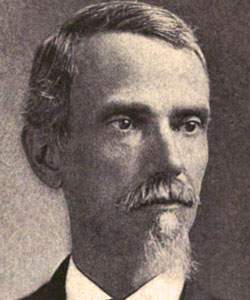George William Bagby (American National Biography)
Scholarship
From 1857 to 1859 Bagby resided in Washington, where he served as correspondent for a number of southern newspapers. During this period, in 1858, he sent the first of eight "Mozis Addums" letters to the Southern Literary Messenger in Richmond. The letters are modeled on the speech of backwoods characters Bagby had known as a youth in southside Virginia and are influenced by the well-established tradition of southwest dialect humor. The letters, addressed to a friend named "Billy Ivvins" in "Curdsville, Va.," recounted the rustic and innocent narrator's many burlesque adventures in Washington, D.C., including a trip to see the president that ends up in the disreputable establishment of a faro dealer. They were an immediate success and were no doubt partly responsible for Bagby's being named editor of the Southern Literary Messenger in 1860.
Bagby gratefully received the call to Richmond, for he had come to feel increasingly alienated by the antislavery fervor of many of Washington's politicians. The secession that Bagby fervently supported in Messenger editorials soon came, but the ensuing war had a disastrous effect on his magazine. After struggling for more than three years to keep the publication alive in the face of dwindling paper and ink supplies and gradually shrinking subscriptions, Bagby resigned his position as editor in January 1864, five months before the Messenger ceased publication.
Bagby's fortunes were so closely tied to the Confederacy that he fled Richmond with Jefferson Davis's entourage one day before the city fell to Union troops.
Bagby gratefully received the call to Richmond, for he had come to feel increasingly alienated by the antislavery fervor of many of Washington's politicians. The secession that Bagby fervently supported in Messenger editorials soon came, but the ensuing war had a disastrous effect on his magazine. After struggling for more than three years to keep the publication alive in the face of dwindling paper and ink supplies and gradually shrinking subscriptions, Bagby resigned his position as editor in January 1864, five months before the Messenger ceased publication.
Bagby's fortunes were so closely tied to the Confederacy that he fled Richmond with Jefferson Davis's entourage one day before the city fell to Union troops.
Ritchie Devon Watson, "Bagby, George William," American National Biography Online, February 2000, http://www.anb.org/articles/16/16-00064.html.
George William Bagby (Appleton's)
Reference
BAGBY, George William, author, b. in Buckingham со., Va., 13 Aug., 1828 ; d. in Richmond, Va., 29 Nov., 1883. He was educated at Edgehill school, Princeton. N. J., and at Delaware college. Newark, Del., leaving the latter at the end of his sophomore year. Subsequently he studied medicine and was graduated at the medical department of the University of Pennsylvania. In 1853 he became editor of the Lynchburg (Va.) daily " Express," and was for some time the Washington correspondent of the New Orleans "Crescent," Charleston " Mercury," and Richmond " Dispatch." From 1859 he was, until its suspension near the end of the war, editor of the "Southern Literary Messenger." and at the same time associate editor of the Richmond " Whig," and a frequent contributor to the "Southern Illustrated News." From 1 Jan., 1870. to 1 July, 1878, he was state librarian of Virginia. He lectured frequently, and met with success as a humorist in many parts of Virginia and Maryland. He was the author of many humorous articles published under the pen name of " Mozis Addums." His sketches were collected and published by Mrs. Bagby, as "The Writings of Dr. Bagby ".
James Grant Wilson and John Fiske, eds., "Bagby, George William," Appleton’s Cyclopaedia of American Biography (New York: Appleton & Co., 1888), 1: 135.





